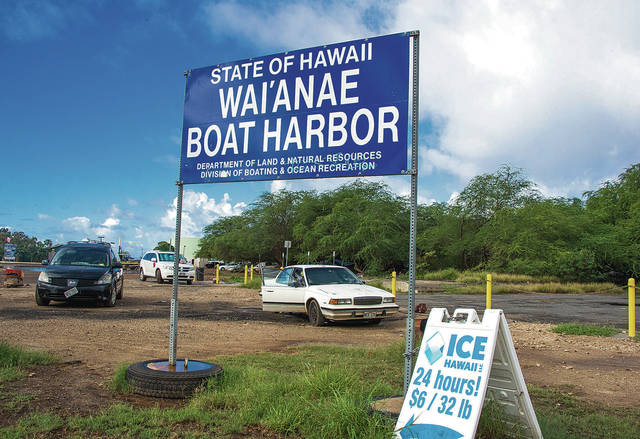Lawmakers seek solutions for Waianae encampment

CRAIG T. KOJIMA/CKOJIMA@STARADVERTISER.COM
On Farrington Hwy, the Waianae Boat Harbor sign has several homeless living in cars.
Leadership in the state House of Representatives tabled a bill Tuesday that would have protected roughly 200 residents of a long-standing homeless encampment near the Waianae Small Boat Harbor from being swept from the state-owned property.
Lawmakers say the measure is unnecessary because they are now working with Gov. David Ige’s office to help begin transitioning residents of Pu‘uhonua o Waianae — one of the state’s largest homeless encampments — to permanent or transitional housing. The word “puuhonua” in Hawaiian means place of refuge or sanctuary.
House Bill 2754 would have carved out an exemption Opens in a new tab for the encampment — between Waianae High School and the boat harbor — from the law prohibiting trespassing on state land. The bill had been scheduled for an initial public hearing today before the House Committee on Health and Human Services, but the committee’s chairman, Rep. John Mizuno, said the measure was removed from the agenda.
“There is no need at this point to hold a hearing on that bill because we’re in such strong communications with the governor’s office now and the city,” Mizuno (D, Kamehameha Heights-Kalihi Valley) said. “We’re happy the dialogue has been brisk, and we think we can come up with a reasonable solution for the benefit of all parties.”
Ige says he did not intervene in the matter. Scott Morishige, the governor’s coordinator on homelessness, said in general the state works to ensure there is space available in shelters or long-term housing programs before implementing any enforcement action.
Morishige cautioned that “it might not be possible for everyone in this area to relocate as one group.”
Don't miss out on what's happening!
Stay in touch with breaking news, as it happens, conveniently in your email inbox. It's FREE!
“But we do know that there are vacancies in shelters throughout the island, and there are resources that may be options for some of the individuals,” Morishige said. “But there’s no guarantee that everybody can be moved as one unit, because we have to work with the resources available in the system. Also, we cannot compel or mandate someone to accept an option — all we can do is offer the resources available.”
House Majority Leader Della Au Belatti, a lead sponsor of the bill, credits HB 2754 Opens in a new tab with drawing attention to the issue.
“We started this (legislative) session with homelessness and housing being kind of the key focuses. That bill was a way to highlight that we know that there is an encampment out there and that a mass sweep of 200 to 300 people could cause chaos,” Belatti (D, Moiliili-Makiki-Tantalus) said. “What I think the bill has done is spark the conversation that’s going to help us, the House of Representatives, the Senate and the governor to come up with this orderly transition plan.”
HB 2754 was also sponsored by Rep. Sylvia Luke (D, Punchbowl-Pauoa-Nuuanu) and Rep. Greg Takayama (D, Pearl City-Waimalu-Pacific Palisades).
The Waianae encampment was once looked to as a potential model for how permitted “safe zones” or tent cities could work as the state grapples with the highest per capita rate of homelessness in the nation. But the state Department of Land and Natural Resources, which owns the 20-acre parcel and the adjacent boat harbor, says it needs to address mounting concerns ranging from hygiene and trash to soaring water use at the harbor and the destruction of natural and cultural resources.
Belatti said Rep. Cedric Gates, whose West Oahu district includes Pu‘uhonua o Waianae, is taking the lead for the House on helping to connect residents with housing solutions.
“What we don’t want is to compound the homeless problem on the Waianae Coast and throughout the island by sweeping or removing 200 to 300 people from this one encampment,” Gates (D, Waianae-Makaha-Makua) said. “The plan right now is to work closely with the governor’s office to develop a comprehensive plan on how we will transition these families into transitional housing as well as permanent housing, because I think that’s the goal for that encampment — to get people housed.”
Gates said his office regularly receives complaints about criminal activity in the area and concerns about its proximity to public schools.
“We have kids walking past there every day, and I think what the community doesn’t want is to promote that kind of lifestyle for our keiki,” he said.




